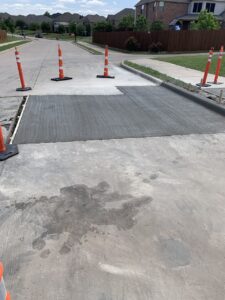 If you combine water, sand, cement, and crushed rocks or gravel in the right proportions, you will have a building and paving material that has been used for centuries. In fact, opus caementicium was one of the most popular products used in ancient Rome, and numerous examples still exist. Although the formula used today is not identical to the one used in Rome, concrete is still an extremely important material. However, if you have ever seen a concrete crack, you may be wondering how such a strong material could possibly develop a crack.
If you combine water, sand, cement, and crushed rocks or gravel in the right proportions, you will have a building and paving material that has been used for centuries. In fact, opus caementicium was one of the most popular products used in ancient Rome, and numerous examples still exist. Although the formula used today is not identical to the one used in Rome, concrete is still an extremely important material. However, if you have ever seen a concrete crack, you may be wondering how such a strong material could possibly develop a crack.
Table of Contents
ToggleWhy Does Concrete Crack?
Whether you want to discuss concrete parking lots, sidewalks, or dumpster pads, you need to realize that there are various reasons why the pavement might crack. However, when concrete companies install a pavement correctly, cracking can normally be attributed to one of four factors. These are swelling, shrinkage, corrosion, and deformation.
What Do Concrete Contractors Mean When They Attribute Cracking to Swelling?
Swelling has several possible causes, but they all have to do with creating internal tensile forces that can be strong enough to cause cracking. Here are three of the most common causes of swelling in concrete parking lots and other pavements.
1. Sulfates and other salts in the soil that lies in directly under or beside the pavement can cause cracking. This is due to a chemical reaction between the salts and the aluminate contained in the cement that creates an expansive substance.
2. Swelling can also result from free water in the mix that freezes. When the water turns to ice, the volume is increases.
3. Another potential cause of swelling is the oxidation of the rebar in the pavement.
How Might Shrinkage Make Concrete Crack?
There are two types of shrinkage that concrete companies hope to avoid.
1. Thermal shrinkage, which normally is more likely to occur in large structures, can cause cracking. During the curing process, an exothermic reaction generates heat, but the heat is seldom equal throughout the entire structure. The temperature variation can cause differential deformation.
2. Hydraulic shrinkage is related to the evaporation of water in the concrete mix. The shrinkage prevents deformation, but it generates internal stress that can exceed the concrete’s strength. Hydraulic shrinkage normally only affects pavements that are installed in dry, hot weather.
What Do Concrete Contractors Mean When They Talk About Corrosion?
Contractors are generally referring to the corrosion of the rebar contained in the pavement. Some property owners insist on not using rebar to lower their concrete cost. One justification that many of them try to use is that rebar can rust, thus increasing the likelihood of needing a concrete repair. However, neither argument is truly valid. On a typical installation, rebar will only amount to approximately 20% of the total concrete cost, but it can provide the extra strength needed to reduce the need for concrete repairs. Furthermore, if corrosion has occurred, it is because moisture is already present around the rebar. Cracking can occur once the volume of rust exceeds the initial volume of the rebar, which results in tensile stress.
What Causes Deformation Concrete Cracks?
Like many types of pavement damage, deformation cracks can be caused by several factors. However, there are two factors that are the primary cause of cracking.
1. If the pavement is subjected to loads that exceed its design specifications, cracking can result.
2. If the soil beneath the pavement settles or moves, the pavement may crack.
HI-TEK Paving is a reputable concrete company and asphalt paving company. We offer a wide range of services, including the installation of concrete parking lots, concrete repair, asphalt paving and repair, parking lot striping, asphalt overlays, sealcoating, parking lot maintenance, and asphalt crack repair. We are known for the exceptional quality of our work, our commitment to customer satisfaction, and our professional project management. If you would like to request a free quote, contact us by phone at 214-908-9641, fill out our online form, or send an email to Info@HI-TEKPavingDallas.com.
